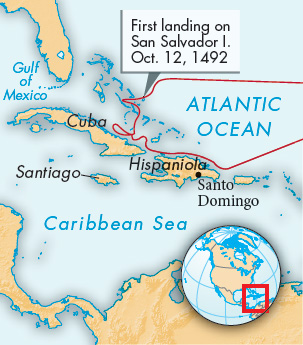Christopher Columbus’s Voyages to the Americas
The westward voyages of Christopher Columbus (1451–1506), a native of Genoa, embodied a long-standing Genoese ambition to circumvent Venetian, and then Portuguese, domination of eastward trade. Columbus was knowledgeable about the sea. He had worked as a mapmaker, and he was familiar with the most advanced navigational innovations of his day. The success of his first voyage to the Americas, which took him across the Atlantic to the Caribbean in thirty-three days, owed a great deal to his seamanship.
Columbus was also a deeply religious man. He had witnessed the Spanish conquest of Granada and shared fully in the religious and nationalistic fervor surrounding that event. Like the Spanish rulers and most Europeans of his age, he understood Christianity as a missionary religion that should be carried to places where it did not exist.

Although the spread of Christianity was an important goal, Columbus’s primary objective was to find a direct ocean trading route to Asia. Inspired by the stories of Mandeville and Marco Polo, Columbus also dreamed of reaching the court of the Mongol emperor, the Great Khan (not realizing that the Ming Dynasty had overthrown the Mongols in 1368). Based on Ptolemy’s Geography and other texts, he expected to pass the islands of Japan and then land on the east coast of China.
Before Columbus could begin his voyage he needed financing. Rejected for funding by the Portuguese in 1483 and by Ferdinand and Isabella in 1486, he finally won the support of the Spanish monarchy in 1492. The Spanish crown agreed to make him viceroy over any territory he might discover and to give him one-tenth of the material rewards of the journey. With this backing, Columbus and his small fleet left Spain on August 3, 1492. He landed in the Bahamas, which he christened San Salvador, on October 12, 1492.
On his arrival in the Bahamas Columbus believed he had found some small islands off the east coast of Japan. In a letter he wrote to Ferdinand and Isabella on his return to Spain, Columbus described the natives as handsome, peaceful, and primitive. Believing he was in the Indies, he called them “Indians,” a name that was later applied to all inhabitants of the Americas. Columbus concluded that they would make good slaves and could quickly be converted to Christianity. (See “Listening to the Past: Columbus Describes His First Voyage,” page 418.)
Scholars have identified the inhabitants of the islands as the Taino (TIGH-noh) people, speakers of the Arawak language, who inhabited Hispaniola (modern-day Haiti and the Dominican Republic) and other islands in the Caribbean. Columbus received reassuring reports from Taino villagers of the presence of gold and of a great king in the vicinity. From San Salvador, Columbus sailed southwest, believing that this course would take him to Japan or the coast of China. He landed instead on Cuba on October 28. Deciding that he must be on the mainland of China near the coastal city of Quinsay (now Hangzhou), he sent a small embassy inland with letters from Ferdinand and Isabella and instructions to locate the grand city.
The landing party found only small villages. Confronted with this disappointment, Columbus focused on trying to find gold or other valuables among the peoples he had discovered. The sight of Taino people wearing gold ornaments on Hispaniola seemed to prove that gold was available in the region. In January, confident that its source would soon be found, he headed back to Spain to report on his discovery.
Over the next decades, the Spanish would follow a policy of conquest and colonization in the New World (see pages 420–422). On his second voyage, Columbus forcibly subjugated the island of Hispaniola and enslaved its indigenous peoples. On this and subsequent voyages, he brought with him settlers for the new Spanish territories. Columbus himself, however, had little interest in or capacity for governing. Arriving in Hispaniola on this third voyage, he found revolt had broken out against his brother. A royal expedition sent to investigate returned the brothers to Spain in chains. Although Columbus was quickly cleared of wrongdoing, he did not recover his authority over the territories.
To the end of his life in 1506, Columbus believed that he had found small islands off the coast of Asia. He never realized that he had found a vast continent unknown to Europeans, except for a fleeting Viking presence centuries earlier. He could not know that the lands he discovered would become a crucial new arena for international trade and colonization, with grave consequences for native peoples.